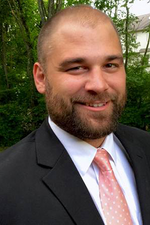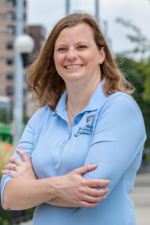
“I chose the program for a few reasons. I was working in Chicago with the Head Start program and was seeing a lot of health issues that were coming up in our community. I realized there was not a lot I could do without a public health degree. And I actually spoke to Dr. Cristina Redko when I was inquiring about schools in Illinois or Ohio. She sold me on the global health completely because I knew I could make a larger system change but I needed a degree to do that. I felt very welcome back in Dayton, I grew up here, and just speaking with her (Dr. Redko) realizing ‘wow, they’ve attracted global international individuals to teach at this school.’ It also impressed me how personalized they made the program. I felt as a student that I was the priority at all times. That was a real draw to me, coming from a larger city where you kind of feel like a number and that you’re just getting a piece of paper. I really wanted to go to a program that would give me practical experience as well, and that was something Dr. Redko sold me on—that I would get real experience working with either local public health agencies or connect with someone working in the field. That really encouraged me. After working 10 years, I was a little nervous to go back to school, but knew I had to. It just made me feel like, I can do this, even as an older adult coming back into it.”
Emily Surico, BSW, M.P.H., ’15, OCPS
Independent Consultant, Public Health - Dayton & Montgomery County

The M.P.H. program at Wright State truly helped prepare me for my current position as a communicable disease epidemiologist. Being able to explore my varied interests with dedicated, passionate faculty members allowed me to become a well-rounded public health professional.
I left the program with a solid foundation in epidemiology and biostatistics, which let me jump in right away with outbreak investigations and reportable disease surveillance. I deployed to Guinea with the Centers for Disease Control’s Ebola response (team) in 2015, and my understanding of global health and the complex factors impacting it was invaluable as a field epidemiologist.
The emergency preparedness coursework has enabled me to take a more active role in preparedness planning for statewide events, including Ebola contingency planning, and being a member of the Missouri Rapid Response Team, which responds to food-related outbreaks impacting both humans and livestock.
Kathleen Henschel, M.P.H. ’13
Epidemiology Specialist, Missouri Department of Health and Senior Services

"When looking for an MPH, I wanted a program that was in-person, in close proximity, and offered classes at a time of day that would allow me to be available for my children during the day - the program at Wright State fit all those criteria.
Once in the program, I found that the professors were knowledgeable, approachable, and very involved in the community. In addition, the wide variety of cultures, experiences, and disciplines represented in the student population lead to meaningful, thought-provoking discussions.
When I began as an Epidemiologist for Public Health – Dayton & Montgomery County, I found that courses required to complete my MPH adequately prepared me for the requirements of my position – especially the Biostatics and Epidemiology classes. Overall, the coursework provided a deeper insight into public health issues and concerns that I have had to consider daily as I collect and analyze data.
My connection to the Wright State MPH program did not end when I graduated. I have worked with professors on grants, committees, and research. Additionally, they have always been available when I needed professional advice."
Dawn Ebron, M.S., M.P.H. ’11, CPH
Epidemiology Supervisor

Public Health, by its very nature, is in a constant state of flux. Fortunately, the education and experience I obtained through the Master of Public Health Program at Wright State University prepared me for the real world challenges that a public health professional must often face. Program staff, with expertise from all corners of public health, helped tailor coursework and opportunities that allowed for me to pursue my interests in environmental health and zoonotic disease prevention, as well as to establish important, long lasting professional relationships with other public health professionals.
As the years have passed since graduation, the core competencies of public health I developed through the program have remained ever so useful. With the acquired skillset, I was able to guide Preble County Public Health to the achievement of National Public Health Accreditation in May 2016, being among the first 125 health departments in the country and the first in Southwest Ohio to achieve this recognition.
Perhaps the best compliment I can attribute to the WSU M.P.H. program is that when working with other WSU M.P.H. graduates, I know I am working with some of best and brightest in the field and am never surprised by their thorough understanding of how to make public health work best.
Erik Balster, M.P.H. ’10, REHS, RS
Health Commissioner, Preble County Public Health

“The masters of public health program prepared me for my current position in a number of ways. One of the most important ways was that it gave me the knowledge and experience I needed for my current job as Director of Environmental Health. It also allowed me to form friendships with other health department staff and people across the community. Those foundational relationships are important as we move forward in protecting the public and the health of the community.”
Jennifer Wentzel, M.P.H. ’07
Director of Environmental Health, Public Health - Dayton & Montgomery County